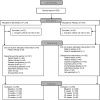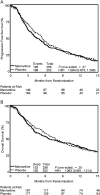Memantine for the prevention of cognitive dysfunction in patients receiving whole-brain radiotherapy: a randomized, double-blind, placebo-controlled trial
- PMID: 23956241
- PMCID: PMC3779047
- DOI: 10.1093/neuonc/not114
Memantine for the prevention of cognitive dysfunction in patients receiving whole-brain radiotherapy: a randomized, double-blind, placebo-controlled trial
Abstract
Background: To determine the protective effects of memantine on cognitive function in patients receiving whole-brain radiotherapy (WBRT).
Methods: Adult patients with brain metastases received WBRT and were randomized to receive placebo or memantine (20 mg/d), within 3 days of initiating radiotherapy for 24 weeks. Serial standardized tests of cognitive function were performed.
Results: Of 554 patients who were accrued, 508 were eligible. Grade 3 or 4 toxicities and study compliance were similar in the 2 arms. There was less decline in delayed recall in the memantine arm at 24 weeks (P = .059), but the difference was not statistically significant, possibly because there were only 149 analyzable patients at 24 weeks, resulting in only 35% statistical power. The memantine arm had significantly longer time to cognitive decline (hazard ratio 0.78, 95% confidence interval 0.62-0.99, P = .01); the probability of cognitive function failure at 24 weeks was 53.8% in the memantine arm and 64.9% in the placebo arm. Superior results were seen in the memantine arm for executive function at 8 (P = .008) and 16 weeks (P = .0041) and for processing speed (P = .0137) and delayed recognition (P = .0149) at 24 weeks.
Conclusions: Memantine was well tolerated and had a toxicity profile very similar to placebo. Although there was less decline in the primary endpoint of delayed recall at 24 weeks, this lacked statistical significance possibly due to significant patient loss. Overall, patients treated with memantine had better cognitive function over time; specifically, memantine delayed time to cognitive decline and reduced the rate of decline in memory, executive function, and processing speed in patients receiving WBRT. RTOG 0614, ClinicalTrials.gov number CT00566852.
Trial registration: ClinicalTrials.gov NCT00566852.
Keywords: brain metastases; cognition; memantine; neuroprotective agents; radiotherapy.
Figures
References
-
- Laack NN, Brown PD. Cognitive sequelae of brain radiation in adults. Semin Oncol. 2004;31:702–713. - PubMed
-
- Monje ML, Palmer T. Radiation injury and neurogenesis. Curr Opin Neurol. 2003;16:129–134. - PubMed
-
- Khuntia D, Brown P, Li J, et al. Whole-brain radiotherapy in the management of brain metastasis. J Clin Oncol. 2006;24:1295–1304. - PubMed
-
- Orrego F, Villanueva S. The chemical nature of the main central excitatory transmitter: a critical appraisal based upon release studies and synaptic vesicle localization. Neuroscience. 1993;56:539–555. - PubMed
Publication types
MeSH terms
Substances
Associated data
Grants and funding
LinkOut - more resources
Full Text Sources
Other Literature Sources
Medical




